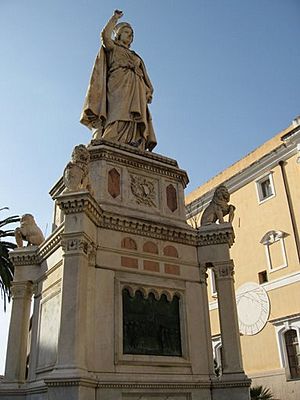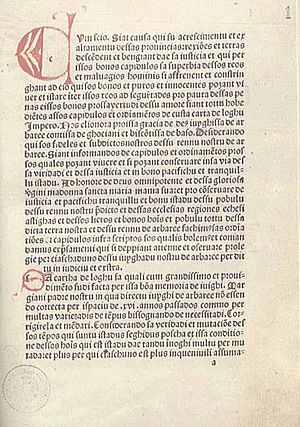Carta de Logu facts for kids

The Carta de Logu was a very important set of laws for the Kingdom of Arborea in Sardinia. It was written in the Sardinian language. A powerful female ruler named Eleanor of Arborea introduced these laws in 1392. The Carta de Logu was used in Sardinia for a very long time. It was replaced by a new set of laws in 1827. These new laws came from the House of Savoy.
Contents
What Was the Carta de Logu?
The Carta de Logu was a major achievement in the history of Sardinia. It was also important for European law. It was a complete and well-organized set of laws. These laws covered many parts of daily life. This included rules for people's rights and rules about crimes. We don't know exactly how the Carta was written. But the Carta itself shows us how people lived in Sardinia long ago. It also shows the languages they spoke.
How the Laws Were Created
The Carta de Logu brought in some modern ideas for its time. It combined different legal traditions. These included old Roman laws and ideas from the Byzantine Empire. It also used legal thinking from other parts of Europe. Most importantly, it included local Sardinian customs. These customs were developed by Sardinian towns.
Fair Rules for Everyone
One special rule in the Carta de Logu was about inheritance. It said that daughters and sons had the same rights to inherit property. This was quite advanced for the time.
Protecting Women's Rights
The Carta de Logu also had rules to protect women. For example, if a man kidnapped a woman, he faced serious consequences. If the woman did not want to marry him, he had to give her a large dowry. A dowry is money or property given to a woman when she marries. This dowry had to match her social standing. It would help her marry someone else. The man also had to pay a big fine or face a severe penalty. These punishments applied even if the woman was already engaged to someone else.
Eleanor's Legacy
Because of the Carta de Logu, Eleanor of Arborea is remembered as a great lawmaker. She was one of the first to set rules for how to treat foreigners fairly. This was based on the idea of "reciprocity." It meant that foreigners should be treated the same way their own country treated people from Sardinia. She also defined the crime of "misfeasance." This meant doing something wrong, especially by someone in a position of power.
See also
 In Spanish: Carta de Logu para niños
In Spanish: Carta de Logu para niños
 | Janet Taylor Pickett |
 | Synthia Saint James |
 | Howardena Pindell |
 | Faith Ringgold |


